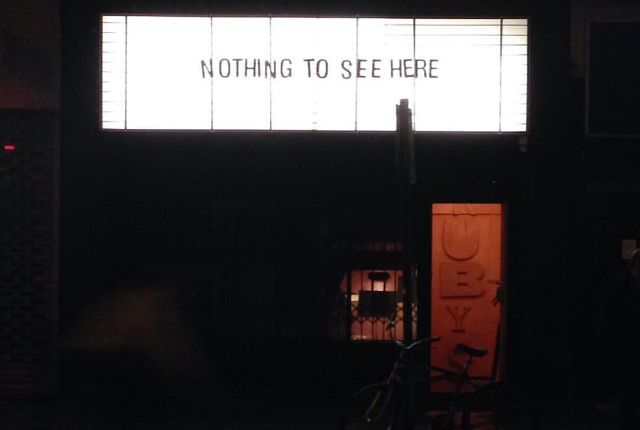Jonathan Dodd’s latest column. Guest opinion articles do not necessarily reflect the views of the publication. Ed
It’s good to find out some new stuff. I like to hear new ideas, and be gifted new words, or new ways to use familiar words. Like, when did ‘gift’ become a verb? And since I’m one of the worst, or best, at making up new words myself, I wouldn’t dream of complaining, especially when sometimes a word arrives that fits perfectly something which I had previously no words for. For instance, I was flicking through a newspaper in Ryde Library (where better to spend some spare time?), and I came across an article buried in the middle pages, which described perfectly something I have always known about myself, and discovered a little about, and it gave it a name.
I’ve previously mentioned not having a visual memory, in the dark depths of the history of this very column. Sometimes I just casually mention such moments, and my amazing editor Sally has been known to trawl through the flotsam and jetsam of my meandering thoughts to find and highlight those columns. Now I feel guilty about it, thinking she might feel honour-bound to do that every time, and then I wonder whether I should not mention them, just in case I cause her trouble and pain in an otherwise extraordinarily busy and eventual life, and then I strangle myself with my own intestinal thought-processes. In the words of the immortal Nora Ephron, in When Harry Met Sally, it becomes a ‘thing’, and then it’s ‘out there’. Hey ho! Sorry Editor Sally, I’m a troublesome contributor, I know.[Don’t worry, it seconds to find and you are in no way troublesome! Ed]
I rather like Aphantasia, because it sounds exotic
Anyway, I was in Ryde Library, with a newspaper, and it was talking about a scientist who’s noticed this phenomenon, and he’s given it a name. ‘Aphantasia’. It relates to the inability of certain people to make visual images in their mind, either when remembering or imagining, although it doesn’t necessarily mean that they don’t make visual images when they dream. This was a new one on me, and I realised that I’ve always been puzzled by having the occasional visual dream, even though I can’t do images otherwise. He wants to study this phenomenon, but in the meantime he has given it a name, and I’m pleased that he has. I rather like Aphantasia, because it sounds exotic. The ‘A’ relates to the Greek version of ‘not’, so it means ‘Not’ being able to make images, as in ‘Phantasia’.

Interestingly, the founder of Pixar says that several of his animators have aphantasia, and make up their images on the page or the tablet without ‘seeing’ them in their minds. That’s a new one for me too. I’ve always been neither good nor bad at drawing, and I’ve always attributed not drawing well to my inability to visualise, but it seems it isn’t necessary after all. What a wonderful world we live in, full of surprises and complicated but fascinating things. I often find that almost anything can reveal many facets and complexities despite appearing to be quite simple at first sight. Thank goodness, or most of these very columns would never get off the ground.
You never see either its flight or its landing
Of course, none of this was what I was originally going to write about here, so I’ll get back to the original thing and discover that it’s all part of the same thing after all by the time I arrive at the end. That’s one of the most delightful elements of writing these columns, at least for me. I have no idea what you, dear reader, if you’re even still reading this, might be making of it all. I’m just grateful of the opportunity (Thank you Sally again) of offering it to an unknown audience in the vague hope that someone somewhere might find it interesting or entertaining in any way. Every writer knows this. You finish your words, fold your paper, and launch it through a high window into the dark night, and you never see either its flight or its landing.

I was going to write about people’s reactions and responses. When an event occurs, there are often differences of opinion about it, and different reactions. This is perfectly normal, and distinguishes us from ants, who I realise I have always thought of as automatons without individual characteristics. I might be entirely wrong in this. If an ant colony is attacked, I’m now wondering whether there are pacifist ants who refuse to fight on principle, because they realise that violence only breeds violence and it would be far better to share and discuss one’s problems with one’s neighbours over the ant equivalent of a nice cup of tea. I apologise to any sentient and conscientious ants reading this.
Proof of the existence of God
When Notre Dame was burning, there was universal horror and shock, followed by a multitude of reactions. Some are very grateful to the large number of donors towards the rebuilding funds, while others have noticed that it can be good for saving taxes. Yet others think the Catholics should spend their money feeding the poor or settling numerous court cases concerning abuse, and so on. I particularly liked the social media about the golden cross still hanging on the wall when everything around it was burning. It was suggested that this was a miracle which proves the existence of God once and for all, until it was pointed out that gold melts at a temperature much higher than the temperature of burning wood.

We react in our own way, and we express our own reactions in our own way. Some become angry, and some of these express their anger by shouting, or blaming the first thing they think of, and some go very quiet. Sometimes anger gets sublimated into resentment, or political activity, or creativity, or it can be turned on others, or it can become depression or even lead to illness of various sorts. All of this is perfectly natural, but it can be so strong that the person reacting in their own way forgets that another person might be feeling just as strongly as they are, but they have a completely different way of showing it. I often hear stories within relationships after a difficult event, when one person weeps and breaks things, and the other becomes very quiet and finds themselves incapable of talking about it at all. This can often sadly lead to a breakdown in communication, even though they’re both feeling just as bad, and in the same way, but they can’t see it happening in the other.
Unanswerable questions designed to make you think
We aren’t generally very aware of ourselves. Even those of us who like to feel we’re quite sophisticated can get it very wrong. And no matter how clever we are, we usually miss out half of the elements involved because we’re concentrating on one or two. I was having a conversation with a new friend recently, about books. He reads non-fiction and I read novels, and we came to a place where he had read in a book about an ethical dilemma relating to driverless cars. I recognised the idea from reading about it in a novel, although I realise it originated in philosophy. It’s one of those unanswerable questions designed to make you think.

The version I’m familiar with concerns a signalman and a runaway carriage, travelling downhill. He can see four workmen ahead of the carriage, who will be crushed if he doesn’t divert it by switching the points. But there’s a train coming up the hill on the other track, and the train driver would be killed if he pulls the lever. Also, he doesn’t know who else might be affected in that train. The question is whether he should switch the points or not. My friend had an identical scenario, but the circumstances were totally different. This is set in a future when all vehicles are automated, and the unlikely event of something going wrong.
Who would decide such things?
If a person is in an automated car, and a situation arises in which the car will plough into an obstruction up ahead, or it could swerve into another lane, probably killing a family in another automated vehicle. In this case, the computer will make a decision based on its programming. Should the code protect the person who has the contract for the journey and let the family perish, or should the coding order the vehicle to preserve as much life as possible, maybe even giving more weight to a young life instead of an older person, or the importance or wealth or power of that person, or any other factor? Who would decide such things?

I’ve probably made a mess of describing this, but on the one hand we have the traditional discussion about human nature, and those moments when a decision has to be made, and on the other side we have a meeting in a room where instructions are thrashed out about who should live or die, which will be coded into a vehicle with human occupants, at some indeterminate future moment. I loved that moment when I realised I was in completely new territory. I don’t have an answer to any of this, but my mind is still fizzing with ramifications, and it also made me think about what my hand on the lever would do – switching or not switching those points. Technology makes things even more complicated, because it changes the elements of any calculation.
None of us know how we’ll react in an emergency
Computers are fast enough to make decisions based only on the information they have at that moment. They will act in a completely straightforward way, which heightens the need for very precise design, and an understanding of the consequences of any action. Humans usually have a get-out, because none of us know how we’ll react in an emergency. I certainly don’t. So far, I seem to be able to keep a clear head, in my few epochal or apocalyptic moments. But there’s no reason that I can see for that to be the same at all times. On the other hand, my experience of most people in charge of computer systems doesn’t give me confidence in their ability to make good decisions that might affect future people at the mercy of their code.

I suspect that the future of all this will be thrashed out in the courts, with the legal people making good money, and the software designers will have to become ethical, not because ethical is good, but because unethical will become too expensive.

Thus are all human problems dealt with, I fear. I think we’re going to need a new word for that. Ethiconomics, maybe.
If you have been, thank you for reading this.
Image: ciroduran under CC BY 2.0
Image: max pixel under CC BY 2.0
Image: pexels under CC BY 2.0
Image: public domain under CC BY 2.0
Image: bosta under CC BY 2.0
Image: SreeBot under CC BY 2.0
Image: Katherine under CC BY 2.0





